English_for_Secretary_Unit_1 文秘英语
- 格式:ppt
- 大小:177.50 KB
- 文档页数:34
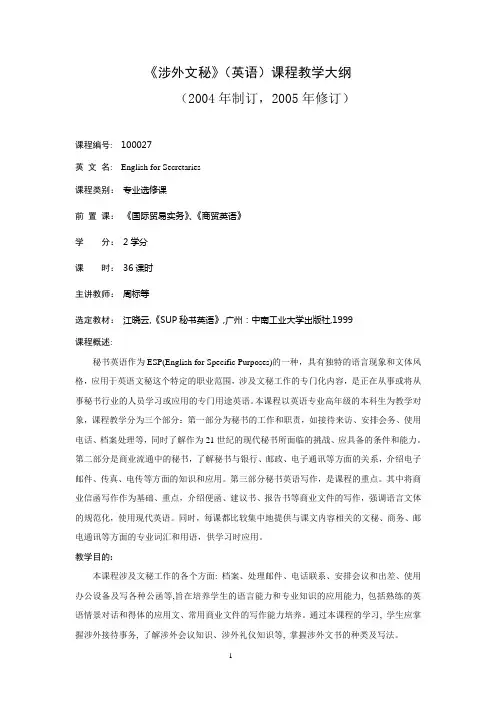
《涉外文秘》(英语)课程教学大纲(2004年制订,2005年修订)课程编号: 100027英文名: English for Secretaries课程类别:专业选修课前置课:《国际贸易实务》、《商贸英语》学分:2学分课时:36课时主讲教师:周标等选定教材:江晓云,《SUP秘书英语》,广州:中南工业大学出版社,1999课程概述:秘书英语作为ESP(English for Specific Purposes)的一种,具有独特的语言现象和文体风格,应用于英语文秘这个特定的职业范围,涉及文秘工作的专门化内容,是正在从事或将从事秘书行业的人员学习或应用的专门用途英语。
本课程以英语专业高年级的本科生为教学对象,课程教学分为三个部分:第一部分为秘书的工作和职责,如接待来访、安排会务、使用电话、档案处理等,同时了解作为21世纪的现代秘书所面临的挑战、应具备的条件和能力。
第二部分是商业流通中的秘书,了解秘书与银行、邮政、电子通讯等方面的关系,介绍电子邮件、传真、电传等方面的知识和应用。
第三部分秘书英语写作,是课程的重点。
其中将商业信函写作作为基础、重点,介绍便函、建议书、报告书等商业文件的写作,强调语言文体的规范化,使用现代英语。
同时,每课都比较集中地提供与课文内容相关的文秘、商务、邮电通讯等方面的专业词汇和用语,供学习时应用。
教学目的:本课程涉及文秘工作的各个方面: 档案、处理邮件、电话联系、安排会议和出差、使用办公设备及写各种公函等,旨在培养学生的语言能力和专业知识的应用能力, 包括熟练的英语情景对话和得体的应用文、常用商业文件的写作能力培养。
通过本课程的学习, 学生应掌握涉外接待事务, 了解涉外会议知识、涉外礼仪知识等, 掌握涉外文书的种类及写法。
教学方法:教学目的决定教学内容和教学手段,英语文秘人员特殊的工作性质决定了其所应具备多方面的知识和能力。
英语文秘人员应当是既懂专业同时又了解边缘学科知识,既通晓英,又懂得相关业务的复合型应用人才,秘书英语作为一门实用技能类课程,教学应紧紧抓住语言和应用这个关键。
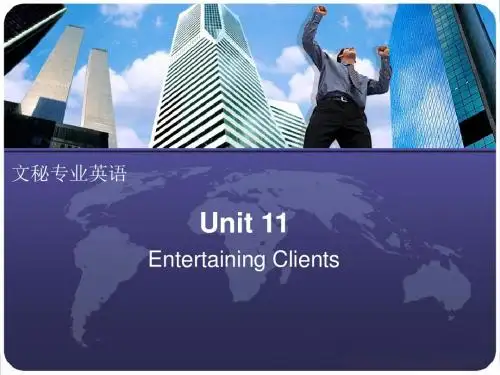
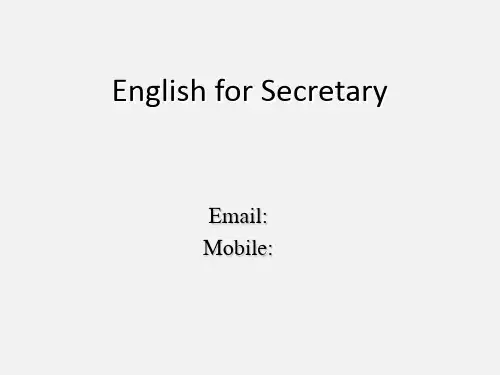
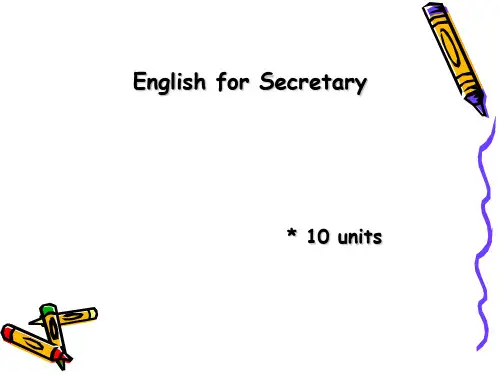
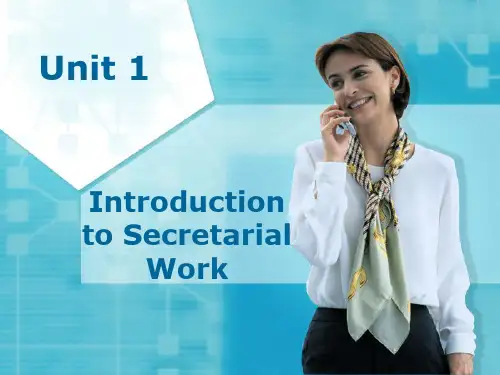
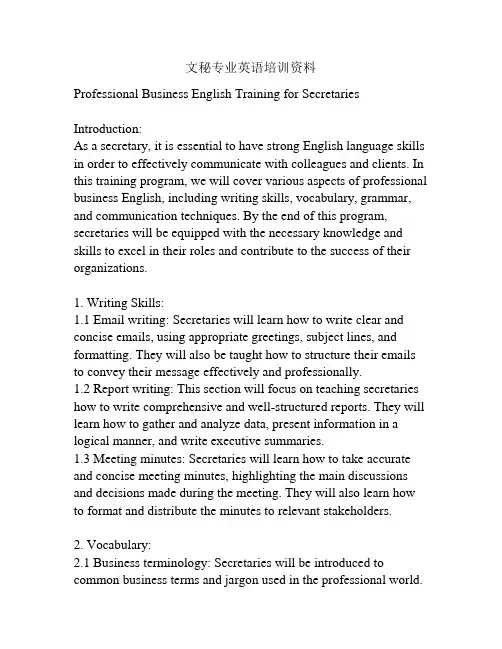
文秘专业英语培训资料Professional Business English Training for Secretaries Introduction:As a secretary, it is essential to have strong English language skills in order to effectively communicate with colleagues and clients. In this training program, we will cover various aspects of professional business English, including writing skills, vocabulary, grammar, and communication techniques. By the end of this program, secretaries will be equipped with the necessary knowledge and skills to excel in their roles and contribute to the success of their organizations.1. Writing Skills:1.1 Email writing: Secretaries will learn how to write clear and concise emails, using appropriate greetings, subject lines, and formatting. They will also be taught how to structure their emails to convey their message effectively and professionally.1.2 Report writing: This section will focus on teaching secretaries how to write comprehensive and well-structured reports. They will learn how to gather and analyze data, present information in a logical manner, and write executive summaries.1.3 Meeting minutes: Secretaries will learn how to take accurate and concise meeting minutes, highlighting the main discussions and decisions made during the meeting. They will also learn how to format and distribute the minutes to relevant stakeholders.2. Vocabulary:2.1 Business terminology: Secretaries will be introduced to common business terms and jargon used in the professional world.They will learn how to use these terms appropriately in their oral and written communication.2.2 Industry-specific vocabulary: Depending on the industry they work in, secretaries will learn industry-specific vocabulary relevant to their organization. This will enable them to better understand and communicate with colleagues and clients.3. Grammar:3.1 Review of grammar rules: Secretaries will review essential grammar rules, such as tenses, articles, and sentence structure. Emphasis will be placed on common mistakes and how to avoid them.3.2 Sentence construction: This section will focus on teaching secretaries how to construct clear and grammatically correct sentences. They will learn techniques to improve sentence flow and coherence.4. Communication Techniques:4.1 Active listening: Secretaries will learn how to actively listen to colleagues and clients, ensuring they fully understand their needs and requirements. They will also learn how to ask relevant questions to clarify any uncertainties.4.2 Telephone etiquette: This section will cover basic telephone etiquette, including proper greeting, tone of voice, and effective communication over the phone.4.3 Body language: Secretaries will learn how to understand and interpret body language, enabling them to better communicate and build rapport with colleagues and clients.Conclusion:By mastering the skills taught in this training program, secretaries will be able to communicate more effectively and professionally in both written and oral English situations. These skills will not only enhance their performance as secretaries but also contribute to the overall success of their organizations. It is recommended that secretaries regularly practice and reinforce these skills to ensure continuous improvement.5. Cultural Awareness:5.1 Cross-cultural communication: Secretaries will learn the importance of understanding different cultures and how it affects communication in a professional setting. They will be taught strategies to effectively communicate with colleagues and clients from diverse cultural backgrounds, such as adapting their communication style and being mindful of cultural differences in business practices.5.2 Business etiquette: This section will cover the proper etiquette in business settings, including greetings, introductions, and appropriate behaviors during business meetings and events. Secretaries will learn the cultural norms and expectations that should be adhered to in their organization and industry.6. Time Management:6.1 Prioritization: Secretaries will learn techniques to prioritize tasks effectively, ensuring they are completed in a timely manner. They will learn how to assess the urgency and importance of tasks and allocate their time accordingly.6.2 Organization skills: Secretaries will be taught methods to maintain an organized workspace and system for managing documents, emails, and appointments. This will help them stay ontop of their responsibilities and ensure they are able to access information quickly when needed.7. Professionalism and Integrity:7.1 Professional conduct: Secretaries will understand the importance of maintaining high standards of professionalism in their roles. They will learn about appropriate behaviors, dress codes, and ethics in the workplace.7.2 Confidentiality: Secretaries will be educated on the importance of maintaining confidentiality in their work, especially when handling sensitive information. They will learn protocols for handling confidential client and company information to ensure it remains secure.8. Problem-Solving and Decision Making:8.1 Analytical thinking: Secretaries will be trained to think critically and analyze situations and information to come up with effective solutions. They will learn how to identify problems, gather information, evaluate options, and make informed decisions.8.2 Proactive approach: Secretaries will learn to anticipate problems and take proactive measures to prevent or minimize them. They will also be taught problem-solving techniques to address issues that arise in a calm and efficient manner.9. Customer Service Skills:9.1 Interpersonal skills: Secretaries will learn how to effectively interact with clients and provide exceptional customer service. They will be taught techniques to build rapport, actively listen toclient needs, and handle difficult situations professionally.9.2 Clear and concise communication: Secretaries will learn how to communicate information clearly and concisely to clients, ensuring they understand the message and are satisfied with the service provided.10. Continuous Improvement:10.1 Self-assessment: Secretaries will learn the importance of self-assessment and reflective practice to identify areas for improvement. They will be encouraged to regularly reflect on their performance, seek feedback, and take steps to enhance their skills and knowledge.10.2 Professional development opportunities: Secretaries will be informed of professional development opportunities, such as workshops, conferences, and online courses, to further enhance their skills in business English and related areas. They will be encouraged to take advantage of these opportunities to continuously update their knowledge and stay current with industry trends.Conclusion:This comprehensive training program equips secretaries with the essential skills and knowledge to excel in their roles as effective communicators and contributors to their organizations. By consistently practicing and reinforcing these skills, secretaries will not only enhance their own professional growth but also contribute to the success and productivity of their organizations. Continuousimprovement and proactive learning are key to staying relevant and successful in today's dynamic business environment.。
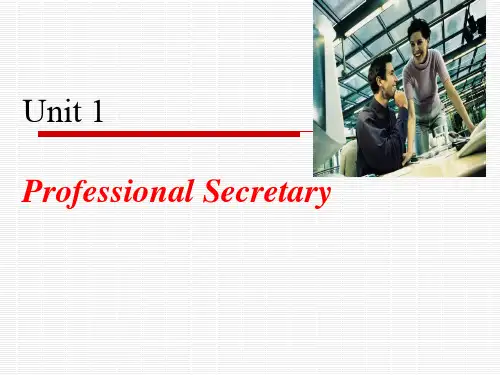
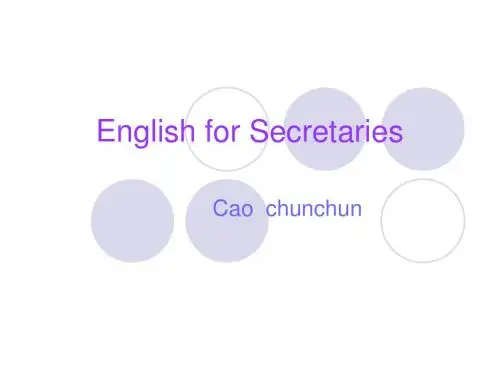
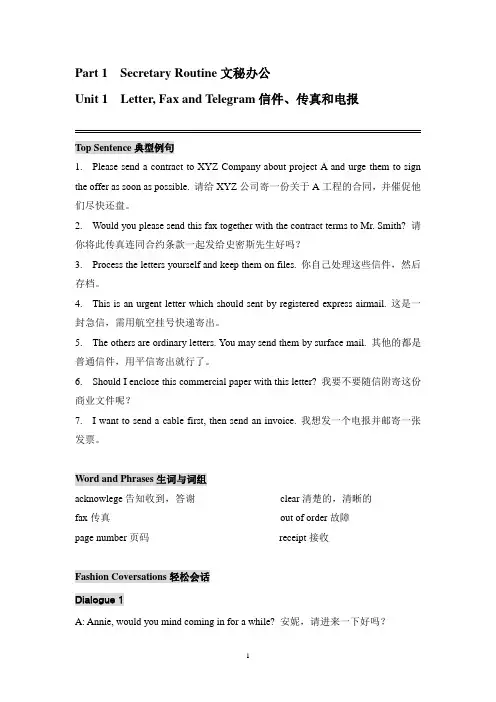
Part 1 Secretary Routine文秘办公Unit 1 Letter, Fax and Telegram信件、传真和电报Top Sentence典型例句1. Please send a contract to XYZ Company about project A and urge them to sign the offer as soon as possible.请给XYZ公司寄一份关于A工程的合同,并催促他们尽快还盘。
2. Would you please send this fax together with the contract terms to Mr. Smith? 请你将此传真连同合约条款一起发给史密斯先生好吗?3. Process the letters yourself and keep them on files.你自己处理这些信件,然后存档。
4. This is an urgent letter which should sent by registered express airmail.这是一封急信,需用航空挂号快递寄出。
5. The others are ordinary letters. You may send them by surface mail.其他的都是普通信件,用平信寄出就行了。
6. Should I enclose this commercial paper with this letter?我要不要随信附寄这份商业文件呢?7. I want to send a cable first, then send an invoice.我想发一个电报并邮寄一张发票。
Word and Phrases生词与词组acknowlege告知收到,答谢clear清楚的,清晰的fax传真out of order故障page number页码receipt接收Fashion Coversations轻松会话Dialogue 1A: Annie, would you mind coming in for a while? 安妮,请进来一下好吗?B: Sure, sir. 好的,先生。
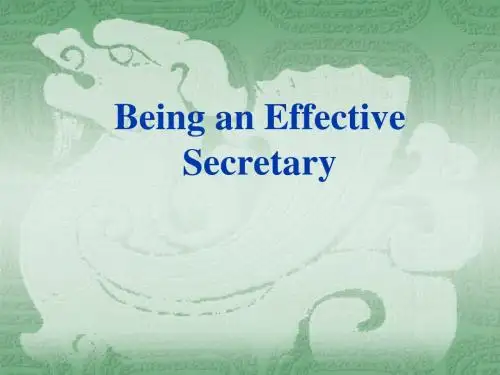
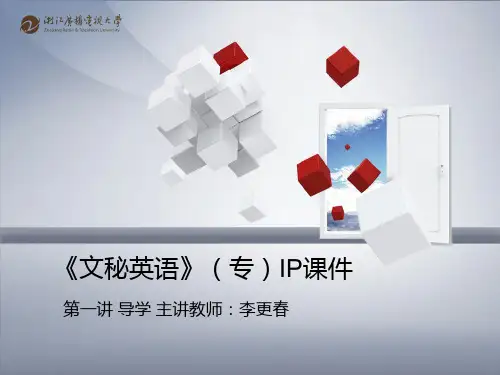
Unit 1 How does one become a secretary?本单元教学要求:1掌握秘书工作性质、写求职信的要领2了解求职过程4熟悉面试形式和准备面试的要领Section 1 Being interviewed一、背景知识面试主要是主考人员通过与应试者直接交谈的方式来考查其是否具备所报考职位应有的才能和某些素质,考查应试者的口头表达能力与交往能力,观察其举止、仪表与气质等。
所谈的多是关于应试者的经历、兴趣、求职动机以及有关的政治、经济、文化、社会等问题。
面试的形式主要有两种,一种是个别面试,另一种是分组面试。
在面试中,一般需要掌握3个原则:实事求是,随机应变,自圆其说。
另外,在面试中,要自始至终保持自信,但不要过度。
二、课前提问:1.What is an interview?2.Why is it done?3.Do you think it necessary? Why or why not?4.What questions do you like to ask if you were an interviewer? And why are they?5.What is an ideal job?6.What impression do you try to give in an interview?三、语言学习1. How do you do? 你好;你好吗?(初次见面时的问候用语)。
“Mary, I want youto meet my friend Fred. Fred, this is my wife, Mary.” “玛丽,2. 见见我的朋友弗雷德。
弗雷德,这是我爱人,玛丽。
”5. regarding (亦作:as regards)[介词] 关于:I wrote a letter regarding mydaughter's school examinations. 我写了一封关于我女儿学校考试的信。